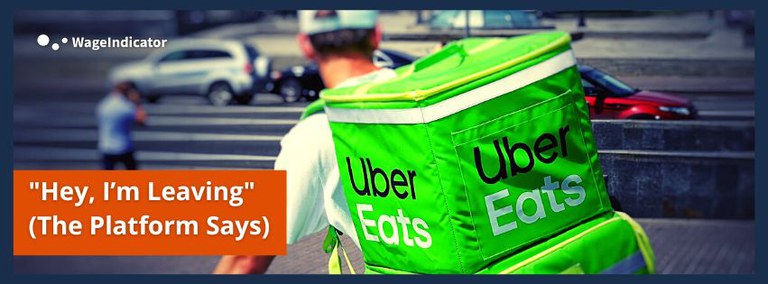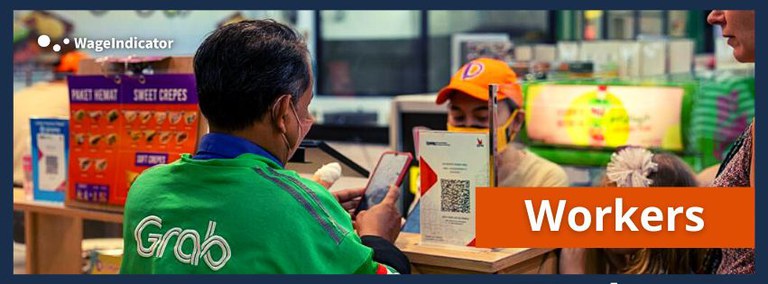A Level Playing Field for Gig Workers: The roads to better collective action
During the webinar ‘A Level Playing Field for Gig Workers,’ on October 27, 2023, we want to explore how gig workers can regain their negotiation power and build a collective voice.
We will address the issue from different angles: research and regulation, worker-owned cooperatives, and other solutions to help gig workers set up collective action and protect their labor rights.
Some speakers have already confirmed their presence:
More speakers will be announced soon.
You can already secure your spot by visiting the event’s webpage.

Thanks to the Ahmedabad interns’ work, we have published new blogs on Gigpedia to investigate various platform economy topics.
We started with The Story of Unionisation in the Mexican Gig Economy to understand why Mexican gig workers are not keen on unionizing and what can be done to bring them together.
A new blog is online: we asked an intern to analyze whether the regional Indian platforms can break the monopolies of bigger giants. May Zomato and Swiggy, the top two giants in the Indian food delivery industry, get some challenges from outsiders?
Did you miss the latest episode of The Gig Work Podcast?
Platform expert Martijn Arets took the train to Leeds (United Kingdom) to interview Vera Trappmann and Simon Joyce, two researchers behind the Leeds Index of Platform Labour Protest.
A research team from the University of Leeds has mapped nearly 2,000 worker protests, showing the dynamics behind the strikes, workers' wishes, and the protests' organization.
Do you want to listen to the other episodes? You can find them in the Podcast section on Gigpedia.

Dear reader,
‘An unprecedented deal.’ This is how Uber Eats Italy's proposal to offer severance pay to jobless riders in the country has been defined.
What happened? Uber Eats exited the Italian market on July 15. Then the company met three unions (Uiltucs, Uiltemp, and CISL) and agreed it would guarantee severance pay to 2,200 couriers nationwide, those who made at least one delivery in the past six months.
Is this an unprecedented deal? Well, no platform did the same in the past, not in Italy. Unfortunately, it does not mean that Italian Uber Eats workers can rely on adequate social security.
Many riders were last active earlier than six months ago and will be left out of the deal. The same applies to those who were deactivated without reason; they will not benefit from the agreement either. Moreover, those who rent other riders’ accounts do not exist for the company, even though the company knows that sub-renting is common.
For these reasons, the USB union asked for a meeting with the Commission of the Lombardy Region for productive activities.
For the same reasons, the CGIL union challenged the dismissals and said it would start legal action.
By the way, a few days earlier, the Turin Labor Court established two workers of Foodinho should be treated as employees, not independent contractors, and recognized their right to refer to the national collective agreement for the Tertiary, Distribution, and Services sector.
These situations often occur throughout Europe and worldwide and need a deeper analysis since many platforms left European countries or other markets in the past few months.
For example, let’s look at how Deliveroo managed its exit from the Dutch market. The British food delivery company halted operations in the Netherlands at the end of November 2022. It agreed with labor union FNV on compensation packages for its workers, consisting of an amount equal to 38% of riders’ income in the past year and an amount based on their employment history (something missing in the agreement between the unions and Uber Eats Italy).
Additionally, as Martjin Arets states in his blog on Zipconomy.nl, ‘“in the agreement, Deliveroo and the rider mutually grant each other final discharge and thereby waive any claims against each other.” That’s interesting because it could mean that ‘when a rider signs, they also agree on not suing the company.’
It’s important to stress that in March 2023, the Dutch Supreme Court ruled Deliveroo riders are employees, not self-employed. Even though the platform left the country, the ruling can have implications for similar cases before the courts, even for companies exiting a national market.
Deliveroo left Australia in the same period, entering voluntary administration. Like many gig economy companies, the platform faced battles over Australian workers’ rights. Labor commissions called on the government to take action in favor of riders, classed as independent contractors. No agreements were reached, and 15,000 riders were left scrambling to find another job.
Deliveroo’s Australian closure came after the business shut operations in Germany, Taiwan, and Spain. As part of the firm’s departure from Spain, the media reported an agreement according to which delivery workers could benefit from “a compensation agreement of 45 days per year worked, with a minimum of €1,000.” Still, they did not share many details about how it came about.
Getir is another platform experiencing severe market fluctuations: it’s preparing to leave Spain, offering impacted workers 20 days’ worth of severance pay per year with a maximum of 12 monthly payments, an outplacement service, and a special agreement for those aged over 55.
Getir also ceased to exist in France on July 19, with the loss of 1,300 jobs. There is still no information on any severance packages for former riders.
As we said, markets are increasingly unstable, and we should get used to these scenarios.
When a platform company leaves a country, it's more than just a question of understanding how much money is guaranteed to workers. As Martijn Arets underlines, "many delivery drivers understandably opt for money in hand instead of a possible compensation after years of litigation." In that respect, the social plans for delivery drivers are a good way out.
However, there is more than this. Or there could be more than this. “Can a platform facilitate riders to (partly) continue its activity after departure? What if a platform includes this possible 'exit' in its design and, upon departure (for whatever reason), has a scenario ready to return the collected resources (data, customer contacts, software, etc.) to those who contributed to its activity?”
It is about transferring part of the platforms’ value to the workers with a long-term perspective. It could be an opportunity for those who want to keep doing this job, and it would be great if unions cooperated.
We ask ourselves: “Why not?”
Have a nice day!
The WageIndicator Gig Team

Argentina - The Buenos Aires court established that Uber violates numerous regulations. Nonetheless, the company insists on continuing to operate and has appealed against the ruling.
Italy - The Municipality of Rome met with the unions and the major food delivery platforms, Glovo and Deliveroo, represented by Assodelivery, to create a Protocol for riders’ work safety. Another meeting will take place in autumn.
Singapore - Singapore Labour Ministry accepted recommendations of a tripartite workgroup on platform worker representation.
Spain - The Social Court number 4 of Madrid has condemned Glovo to pay the Social Security arrears for 280 riders who worked for the company in Murcia and Cartagena during the summer of 2019. The ruling recognizes the existence of an employment relationship.
US - The California Supreme Court allowed workers to sue for labor law violations on the state’s behalf.

Argentina - A councilor presented a draft resolution to defend Rappi workers in Tandil, who raised their voices to claim better working conditions and a detailed payment scheme respecting the distances, schedules, and type of transport of each delivery.
Australia - The Australian Council of Trade Unions has demanded urgent reforms to protect food delivery riders after a worker died on Saturday, Australia’s 12th known death in the sector since 2017.
Germany - Wolt riders spoke up in Berlin against unpaid wages.
Heatwaves: The Greek Ministry of Labour banned deliveries from 12 pm to 5 pm after a delivery worker died in Chalkida. The Σ.Β.Ε.Ο.Δ (SVEOD) union urged businesses not to force riders to work at more than 40 degrees. The labor inspectorate has announced heavy fines for those who continued to make riders work.
India - Delivery partners marched to the Parliament House in New Delhi to demand fair treatment and improved working conditions.
Ireland - Food delivery riders across Dublin denounced being victims of assaults, bicycle theft, and other crimes.
Italy
- Just Eat keeps offering subordinate jobs throughout the country.
- Glovo and Deliveroo riders in Sicily refused to stop working, despite unions calling for service suspension due to the heat.
Did you know? According to a survey done at 400 companies across sectors, the adoption of gig workers rose to 55% of organizations in the June quarter from 30% in the same period a year ago.
Nigeria - The Amalgamated Union of App-Based Transport Workers of Nigeria took to the streets of Nairobi, sensitizing platform workers on the need to unite.
South Africa - Uber, Bolt, and InDriver drivers turned off their apps nationwide, calling for the industry to be better regulated.
Turkey
- Motorcouriers working for Vigo, a subcontractor of Getir, are resisting wage cuts in the Instabul’s municipality of Beşiktaş.
- Couriers in Bursa protested the petrol hike. They joined the call of the Couriers Federation (Kuryeler Federasyonu) and Motorcycle Couriers Association (Motosikletli Kuryeler Derneği.)
US
- Electric bikes, scooters, and mopeds have become more popular and accessible; however, food delivery workers are increasingly at risk of falling victim to fires caused by batteries.
- Justice for App Workers rideshare drivers and supporters protested against the new congestion tax at the Metropolitan Transportation Authority Headquarters.
- American outdoor workers have breathed in dangerous levels of air pollution this year, delivery workers included. Experts call on federal regulators to adopt standards protecting them from worsening air quality.
- Los Deliveristas Unidos support the fight for delivery app workers’ minimum pay: without it, riders must rely on tips to make ends meet.
Initiatives for gig workers: The Worker's Justice Project organized a free tune-up for delivery workers using e-bikes in New York City. They also informed riders about street safety and the new minimum pay law.

India - The Indian state of Rajasthan has approved a bill to impose a surcharge on online transactions via platforms like Amazon, Ola, and Zomato to fund welfare benefits for gig workers, the first such scheme in the country.
Hong Kong - The Hong Kong Competition Commission announced that the two largest online food delivery platforms, Foodpanda and Deliveroo, had agreed to make commitments to address the commission’s concerns about fair competition.

Italy - According to the Turin labor court, Foodhino (Glovo) must pay arrears to two riders from 2019. The entire shift in which the rider is logged into the platform is considered work time and has to be paid consequently.
Portugal - The first hearing of the lawsuit filed by a courier in Portugal against Glovo ended without agreement. The worker claimed his readmission and the formalization of an employment contract.

Arabia Saudita - Delivery Hero, which owns Foodora, is investing 3 billion Swedish kroner (192 million dollars) in the food delivery player Hungerstation.
Argentina
- Uber is preparing to disembark in Santa Fe with motorcycles and plans to conquer Rosario, where it’s still illegal.
- In Buenos Aires, Mendoza, and Córdoba, Uber is incorporating the Priority option, which allows users to request a trip with less waiting time at hours of high demand.
- Rappi’s business expansion continues: the platform has landed in Luján.
Brazil - Rappi is negotiating agreements with large fast food chains as one of its main bets to take on market food leader iFood.
Report: According to the second Fairwork Brazil report, there is still much to do regarding decent work in the country, considering no platform scored more than 3 out of 10 points and no platform gained points on fair conditions and representation principles. AppJusto is in first place with three points, followed by iFood (2 points) and Parafuzo (1 point). All other companies (99, Americanas Entrega Flash, GetNinjas, Lalamove, Loggi, Rappi, and Uber) got zero points.
Denmark - Wolt's online market is growing significantly: the gross profit reached almost 35 million krones.
France - A parliamentary committee has concluded that President Emmanuel Macron helped establish the cab-hailing firm Uber in France through a "privileged" relationship with the online platform.
Germany
- The online supermarket Knuspr offers delivery seven days a week in Munich for the first time. Supermarkets in Germany are not allowed to open on Sundays
- The on-demand delivery platform Getir is facing a significant capital problem.
- Just Eat Takeaway.com partnered with the cosmetics company Lush, making its products available via the Lieferendo application.
Greece - The geographical expansion of Wolt in the Greek territory continues.
Report: The Fairwork Cloudwork Ratings 2023 report shows how platforms are still far from safeguarding the basic standards of fair work. Three of them (ComeUp, Prolific, and Terawork) scored 5 points out of 10. The other 12 platforms (Appen, SoyFreelancer, Upwork, Clickworker, Elharefa, Fiverr, PeoplePerHour, and Scale/Remotasks) could not prove they met more than three of ten thresholds. For four platforms (Amazon MTurk, Freelancer, Microworkers, and Workana), no evidence was found that they met any threshold.
Hungary - Wolt plans to bring its Wolt Drive service to a broader audience as quickly as possible. Wolt Drive offers delivery within one hour for webshops and retailers.
India
- Swiggy will use generative AI techniques to build products and services to enable intuitive ordering experiences. It also designs AI-led solutions to empower restaurant partners to self-serve on processes.
- Swiggy will buy back shares worth $50 million from 2,000 employers as part of its stock option plan.
Nigeria - The third Fairwork Nigeria report examines the conditions of workers on 12 ride-hailing and delivery platforms: workers for only two (Glovo and Mano) earn the minimum wage (fair pay). Only one (Glovo) got a point for the principles of fair management and fair contracts. None of the platforms scored points for fair conditions and representation principles.
Portugal - Uber Eats plans to have over 50 virtual pick-up points on the beaches from North to South of the country and Islands and more than 40 partners with summer lunch menus.
Singapore - Ride-hailing giant Grab has acquired Singapore's third-largest taxi operator.
Did you know? Spanish elections could have ramifications for gig workers since they are at the center of an ideological struggle. However, no single party won enough parliamentary seats on July 23 to form a government.
Spain - Glovo is betting on the return to the office, asking workers who used to work there to come back three days a week since September.
The Netherlands - Nederland Eet raised 95,000 euros within a few days via share funding. The platform wants to offer an alternative to 'high commissions and unfair positioning of restaurants' in ordering apps.
US - Lyft is exploring options for its bikes and scooters unit, including a sale or a strategic partnership.


